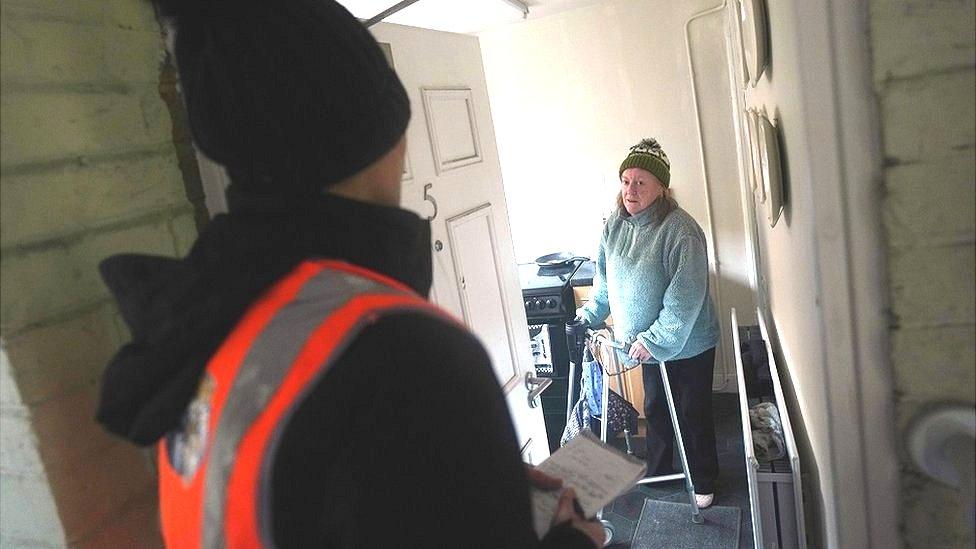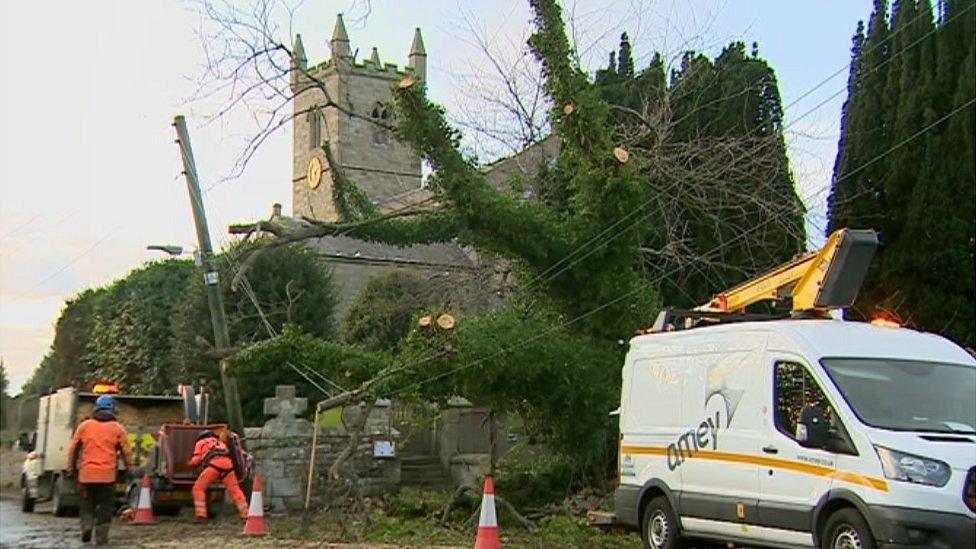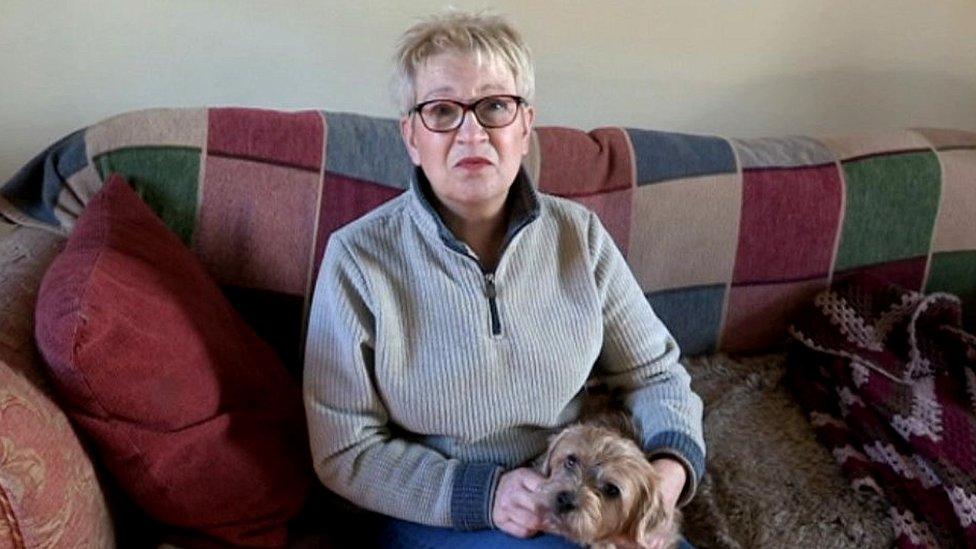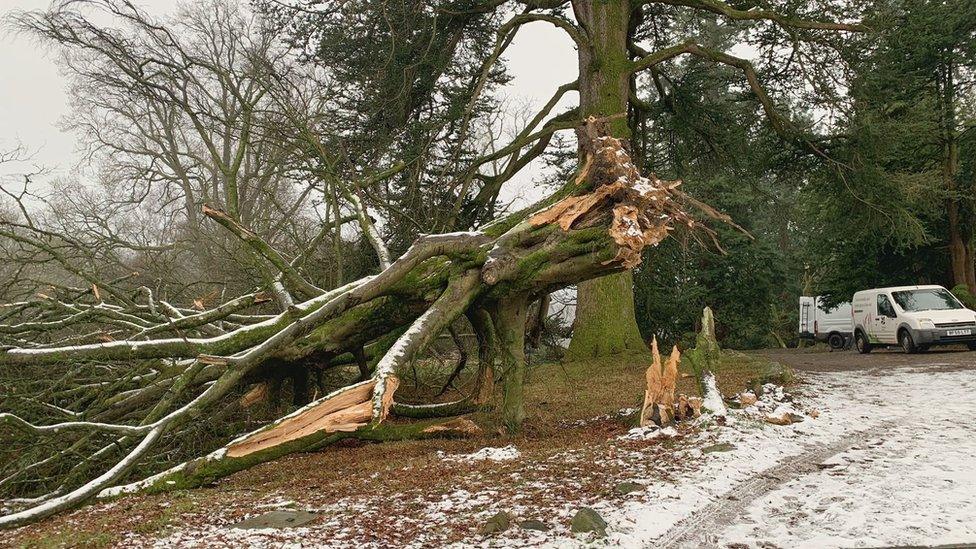Storm Arwen: Major incident declared as thousands without power
- Published

Durham County Council says officials are working to provide relief to residents hit by the storm
A major incident has been declared as thousands of people remain without power six days after Storm Arwen wreaked havoc across northern England.
Durham County Council, which issued the alert, said it followed "one of the worst storms in the last decade".
The move means additional support from the council and emergency services will be made available in the region.
About 9,000 people are without electricity in the North East, while 1,800 are powerless in the North West.
Durham County Council said areas affected since Storm Arwen struck last Friday included Teesdale and Weardale.
Communities in east Durham and to the north and west of Durham have also been badly hit, it said.
The authority said it had declared a major incident as Northern Powergrid (NP) was "not yet in a position to confirm when supplies will be reinstated to all properties across County Durham and it is important that all possible resources are made available to support residents affected by the power cuts".
Government assistance
John Hewitt, chairman of the the county's Strategic Co-ordination Group, said: "We are aware that many people have been left without power for almost a week now and we are working closely with Northern Powergrid to ensure that supplies are restored as soon as possible, particularly those who are vulnerable.
"In the meantime, our priority is ensuring that support is available to everyone who needs it and we have teams from all organisations out in communities offering a range of advice and practical support."
Councillor John Shuttleworth, an Independent who represents Weardale and also cabinet member for rural communities, said declaring a major incident meant the area would have assistance from the government.
He added he hoped the Army would be brought in.

Power and water companies have been working to fix supplies for six days
Council and emergency services staff, along with workers from Northumbrian Water and NP, have been carrying out welfare checks on residents over recent days - providing bottled water, other essentials and access to phones.
'Additional challenges'
Hot food trucks have also been travelling around communities while Durham University has provided up to eight flats as temporary accommodation for families still without electricity supplies, the council added.
Remote, rural locations had caused "additional challenges", it said, with Northumbrian Water working alongside fire crews to install back-up power sources and restore water supplies.
The firm's teams have also been checking pumps and reservoirs across the county.
Organisations involved in the relief effort are set to continue "around-the-clock in the worst-affected areas".

Gordon and Dawn Clarke said they had found help hard to come by
However, some residents have been critical about communication issues.
Gordon and Dawn Clarke, of Middleton, Teesdale, said they had been without power and water for four days with the prospect of four more to follow.
"The not knowing when the power was going to be put back on [has been difficult]," said Mr Clarke.
"If the communication had been better we'd have been better able to deal with the situation."
Ms Clarke added: "As a vulnerable person I was registered with Powergrid and the council and I have a social worker, but there's just been nobody [helping].
"I phoned social services and couldn't get in touch with my social worker."

Workers were earlier attempting to untangle electricity wires from a fallen tree in Whittingham, Northumberland
NP said County Durham and Northumberland were still its worst-affected areas and engineers were making quick temporary fixes but would return to make permanent repairs.
It said that as of 15:00 GMT it had restored power to 230,300 of its customers.
Neil Maxwell, of Doddington Dairy, in Wooler, Northumberland, said the farm had faced the prospect of being unable to milk its cows "for the first time since 1950" after it lost its main electricity supply on Friday followed by its back-up generator on Sunday.
"It's critically important for animal welfare to milk them regularly," he said.
"If you don't milk cows, their udders would become more pressured and eventually they'd get an infection.
"I had a friend who came out, an electrical engineer, who was able to put it back together so we finally got the generator going at midnight on Sunday and milked the cows through the night, but then it broke again in the morning."
After sourcing a replacement on Monday from Preston, in Lancashire, Mr Maxwell said milking had been "going ever since", but the events of the past few days had left him "stressed".
'Final push'
As of 21:00 GMT, Electricity North West, which covers an area from the Scottish border to Manchester, said it had restored power to more than 115,000 properties.
Its engineers were set to work into the night in a "final push" to reconnect the remaining 1,800 properties without supply, which are "predominantly" in Cumbria.
Regulation and communications director Paul Bircham said: "The remaining repair work is extremely complex due to the severity of the damage, but we are confident that no customers affected by Storm Arwen will be without power past the weekend."
After almost a week without electricity, Labour MP Jim McMahon, the shadow secretary of state for the environment, said people across the north of England felt they had been "left standing alone".
"Where is the prime minister? This is a national emergency. There are thousands of people affected. They want leadership."
In response, Boris Johnson said officials were "working flat out".
"Every day we're reducing the number of people with outages. It was a very, very big storm. We're doing everything we can to help people."

Follow BBC North East & Cumbria on Twitter, external, Facebook, external and Instagram, external. Send your story ideas to northeastandcumbria@bbc.co.uk, external.
- Published2 December 2021

- Published1 December 2021

- Published1 December 2021
